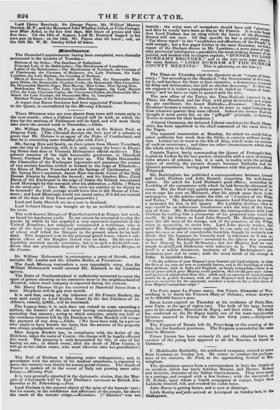The Times on Thursday cited the Spectator as an "
organ of demo. cracy ; " but according to the Standard, " tine Government of thiseoun try is, and has been for three or four centuries, a democracy, tempessi by delay and deliberation, but still an absolute democracy." Ill that case, we suppose it is rather a compliment to be styled an " organ of demo- cracy," and we have no right to quarrel with the title.
The new allies of the Tories, the Tory-Radicals (quoted by the Times, the Standard, and the Post, with great distinction anal respect as, par excellence, the honest Radicals,—Examiner. [Before the Examiner became a courtier, it was not its wont to repel compliments from whatever quarter they were offered. Indeed the sterner Radicals thought it went pretty fur, on the " giff-gaff" principle, in flattering Tories in return for their laudation.] Admiral Ommaney, the defeated Liberal candidate for South Baal. shire, has been appointed to the chief command of the naval force in the Tagus.
The reported insurrection at Bombay, for which we could find no other authority last week than the Globe, is entirely without founds. tion. Letters are in town to the 6th of alay, whieh make no mention of such an occurrence ; and there are other circumstances which show the whole story to be fabulous.
Captain Napier, lately commanding the Queen of Portugal's fleet, is gone to Lisbon by the last packet, ostensibly with a view of claiming some arrears of pension ; but, it is said, in reality with the political object of settling the present dispute between Sahlanha and the Queen's government, having great influence with that general—Rasts Telegraph.
Mr. Buckingham has published a correspondence between himself and Lords Durham and John Russell, respecting his well-known claims. He asked for Lord Durham's good offices; reminding his Lordship of the earnestness with which he had formerly advocated his cause. But the Earl very quietly assures him, that it would he of so use to urge his case on Ministers, after his attack upon them in the newsparrs, in the articles under the title of " Conduct of the Whigs and Tories." Mr. Buckingham then requests Lord Durham to present a memorial for him to the Queen. His Lordship declines shot he says would he an indecorous interference with the duty of the Secre- tary of State. Mr. Buckingham closes the correspondence with Lord Durham by sending him a prospectus of his projected tour round the world. In his letters to Lord John Russell, Mr. Buckingham goes over the old story of his wrongs, rind of the promises of the Whigs, when in oppo:.ition, to assist him. Lord John merely replies, that until Mr. Buckingham is more explicit, he can only say that he looks upon his case as one of considerable hardship, though he certainly now thinks that the language he formerly used in reference to it was ex- aggerated. Mr. Buckingham's memorial to the Queen Watz presented to her Majesty by Lord Melbourne ; but her Majesty had no com- mands to give:Lord Melbourne with reference to it. The memorial itself is a wordy document, laudatory of Mr. Iltrekiogham's per- forts-lances past and to come; with the usual detail of his wrongs in India. It concludes thus- " To the millions of your Majesty's true-hearted and loyal subjects, to when the fats of my case awe now so generally known, and in the hardships of which, these millions, both in India and England, so deeply symputhire—there is as act of grace which your Majesty could perform, that would give more intense mu/ universal satisfirction than this ; while ouch an exercise of royal clemency would be in perfect harmony with all your Mljesty's well known feelings of generous sympathy for the oppressed, and shed a !owe on the earliest dawn of your Majesty's auspicious reign."


























 Previous page
Previous page